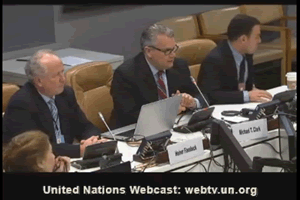The Director of UNCTAD's Division on Globalization and Development Strategies has warned the delegates attending the General Assembly that "misguided" steps are limiting recovery from the global slowdown. He urged measures to boost income equality so that consumer demand is stimulated.
|
Video on UN Webcast
|
Speaking to a full conference room at United Nations Headquarters, Mr. Heiner Flassbeck drew a dark picture of the world economy.
"I know that my colleagues in the economics profession like to say that we are at a critical juncture," said Flassbeck. "But this time it's really true. If you look at the extraordinary measures that the world's largest central banks have been taking for the last two years, and then consider that the world economy is continuing to slow down while unemployment stagnates at very high rates in both the developed and developing countries, and investment remains flat, you understand that we are living in truly extraordinary times."
Flassbeck was in New York to brief delegates on UNCTAD's Trade and Development Report 2012, issued last month.
"Why is the world economy not responding to these unprecedented measures?" Flassbeck asked. He asserted that the answer had to do with misguided policies aimed at improving economic competitiveness through measures that sought to reduce wage costs, either through wage suppression or through exchange-rate measures designed to artificially reduce the cost of labour relative to other countries, in a misbegotten effort to increase exports and incomes. "The fundamental point that policymakers are missing is that by reducing wages, national incomes and aggregate demand fall, and the economy actually shrinks."
Elaborating on this year's Trade and Development Report, which focuses on income inequality, Flassbeck said that the only path to revitalizing sustained growth was for governments to take measures in favour of equality, or fairness, by assuring the participation of all social groups in productivity gains that have come with economic and technological advancement.
More than any other factor, Flassbeck said, the abandonment of the fundamental rule of the post-World War II social compact - that labour would participate equitably in the growth of output - was at the root of the world's current economic difficulties.
Flassbeck said that it was vital that countries work together to formulate policies on reducing inequality, and that they should coordinate the implementation of such measures. The United Nations, he asserted, was the only place where this could happen.
He added that all countries, including developing countries, needed to recognize that they did not need to depend on the outside world to provide the wherewithal for development. The most immediate and readily available instrument for financing the investment needed to spur development was the sovereign authority to 'print money,' Flassbeck said. "This may be viewed as heresy," he said, "but governments should follow the lead of central banks in the United States and United Kingdom and other developed countries - only they should use the printing press to finance investment. What we need today is growth, and that comes by investment in gross fixed capital formation."




